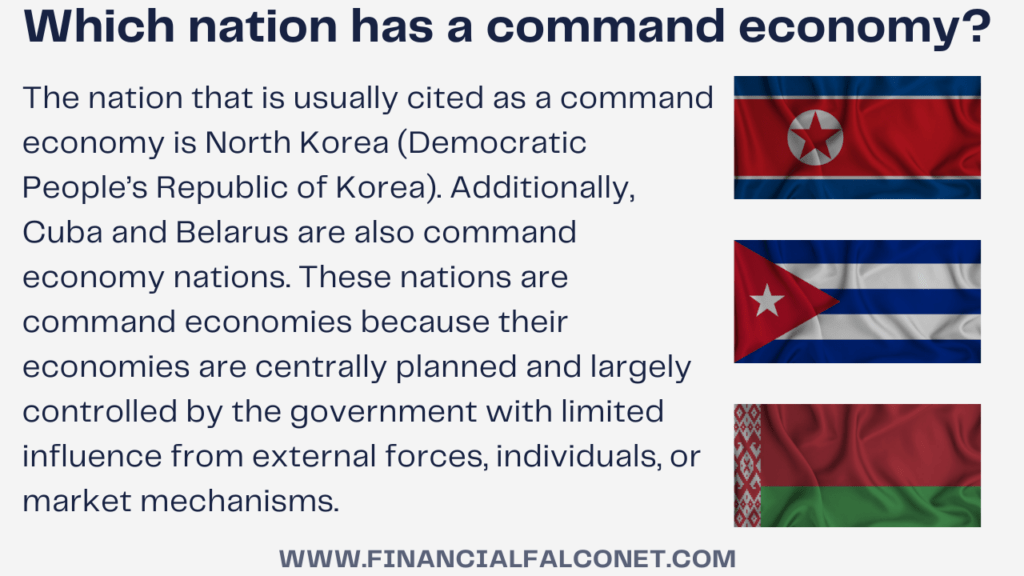Which nation has a command economy? Quite a number of nations have had a command economy in the past including the People’s Republic of China and the Union of Soviet Socialist Republics (USSR) which are the most commonly cited examples of countries that had a command economy. These nations operated a command economy where the government controlled the economic activities of the country including production, investments, distribution, and exchange of products and services. Before we discuss the nations that currently operate a command economy, let us define what a command economy means.
Read about: What is one way a command economy affects the lives of private citizens?
What is a command economy?
A command economy refers to an economic system where the means of production, as well as the distribution and exchange of products and services, are usually coordinated by a central authority. This central authority is usually the country’s government, thus command economies exist mainly in communist states but may also exist in socialist countries. The absence of market mechanisms further characterizes the command economy as the government regulates the prices of products and services.

The private ownership of property is prohibited in a command economy and individuals have to obey the laid down rules and regulations outlined by the government. Hence, individual freedom is minimal; the government further allocates jobs and housing to citizens as they deem fit. A command economy is often considered the opposite of a free market economy where individuals can own property and economic decisions are governed by demand and supply.
Which nation has a command economy?
The nation that is typified as a command economy is North Korea (Democratic People’s Republic of Korea). Additional nations that have a command economy include Cuba and Belarus. These nations are command economies because their economies are centrally planned and largely controlled by the government with limited influence from external forces, individuals, or market mechanisms.
Read about: What is the goal of a command economy?
Nations that have a command economy
- North Korea
- Cuba
- Belarus
North Korea
North Korea has maintained a centrally planned economy since the 1940s and is arguably the only nation that has maintained its position as a command economy for such a long time. Through central planning, the government sets production targets, allocates resources, and determines how the distribution of goods and services is made within the country. Government control of the means of production and major sectors has enabled essential services such as education and healthcare to be provided free for citizens. Additional benefits of this command economy are the minimal level of unemployment, the absence of monopolies, and quick decision-making.
The North Korean government headed by its supreme leader, Kim Jong Un controls most sectors of the economy and plays a dominant role in economic decision-making. This includes setting the prices of products and services, determining and regulating wages and income levels, and allocating housing and jobs, amongst others. Due to the government allocation of jobs and houses, individuals are often faced with the challenge of moving to live or work in a new region based on the government’s directive irrespective of the individuals’ choice to move or not.
Although North Korea has made some market-oriented reforms in recent years such as creating special administrative regions and special economic zones (SEZs) where foreign businesses may operate with tariff and tax incentives, allowing a limited level of private property, private markets, and small-scale entrepreneurship; the government still retains significant control over economic activities, and market forces play a secondary role in determining prices and wages. Thus, the country still maintains its status as a command economy.
Cuba
Another nation that is a command economy is Cuba. This government identifies itself as a socialist government but the economy is centrally planned and most of the means of production are owned and run by the government. A large percentage of the workforce is employed by the government as it owns and controls most of the companies. The main industries of the Cuban economy include biotechnology, tourism, pharmaceuticals, tobacco, and sugar.
Economic activities in Cuba are directed through central planning with the government setting production targets in its various industries. They also allocate resources and determine the distribution of goods and services based on the government’s economic plans. The government controls prices for essential goods and services and often provides subsidies to essential industries to ensure citizens are able to access basic necessities. Monthly food supplies are provided to households at a nominal cost and each household gets this food supply with its ration book.
Wages are also government controlled; private businesses are scant and the individuals working in the private sector get paid through the government due to the minimum wage regime. Due to the government’s tight control of the economy, the market forces of demand and supply play a limited role in determining prices and wages. As is typical with command economies, the government censors the amount of information that is broadcast about the country, hence independent journalism is repressed as is freedom of speech.
In recent times, Cuba is gradually moving towards a mixed economy and has implemented some market-oriented reforms based on its 2018 constitution. This constitution recognized and allowed private property, free market rights, and foreign direct investments in the country. These are aimed at liberalizing the economy and attracting foreign investment by allowing and encouraging the establishment of more private enterprises, reducing restrictions on small-scale businesses, and enabling the participation of foreign investors in the economy.
Belarus
Belarus is another nation that can be classified as a command economy, this is due to the authoritarian nature of the government and its control of the major industries of the country. This country was a former constituent republic of the USSR and became independent with the dissolution of the Soviet Union in 1991. Since then, Belarus has maintained closer political and economic ties with Russia compared to any of the other former Soviet republics.
The country is governed based on its 1994 constitution which has had amendments and revisions that were passed at the national referendums of November 24, 1996 and October 17, 2004. These revisions expanded the powers of the president and further removed the initial 2-term limit of 5 years each. Hence, Alexander Lukashenko has been the Belarusian president since he first assumed power on July 20, 1994.
Additionally, the constitution’s amendment greatly restricted the powers of the Belarusian bicameral National Assembly as they are now accountable to the president who can choose to lead by decree. There is a high level of government restrictions on religion, peaceful assembly, working outside of government-controlled sectors, freedom of speech, and the press.
Despite these command economy disadvantages, the government has tried to keep the prices of foodstuff affordable for citizens by passing laws that ban increases in the price of foodstuff. Belarus also has the lowest rate of unemployment in Europe at 4.17% according to Statista. This low rate of unemployment may however be due to the extant laws forbidding unemployment. A large percentage of the workforce is employed in the agricultural, manufacturing, industrial, trading, and educational sectors.
Read about: What is a Liberal Economy?
Conclusion
Which nation has a command economy? The nations that have a command economy are North Korea, Cuba, and Belarus. The existence of a command economy in these nations has been effective due to the central planning of the economy and the tight grip of the government on major sectors of the economy. Although this has led to the considerable provision of basic amenities to citizens at affordable rates, it has also been occasioned by a high level of individual freedom, consumer choice, and a short supply of many goods and services.
Last Updated on November 2, 2023 by Nansel Nanzip BongdapBlessing's experience lies in business, finance, literature, and marketing. She enjoys writing or editing in these fields, reflecting her experiences and expertise in all the content that she writes.

